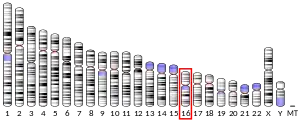Dipeptidase 3
Dipeptidase 3 (DPEP3) is a protein that in humans is encoded by the DPEP3 gene.[5]
| DPEP3 | |||||||||||||||||||||||||
|---|---|---|---|---|---|---|---|---|---|---|---|---|---|---|---|---|---|---|---|---|---|---|---|---|---|
| Identifiers | |||||||||||||||||||||||||
| Aliases | DPEP3, MBD3, dipeptidase 3 | ||||||||||||||||||||||||
| External IDs | OMIM: 609926 MGI: 1919104 HomoloGene: 23357 GeneCards: DPEP3 | ||||||||||||||||||||||||
| |||||||||||||||||||||||||
| |||||||||||||||||||||||||
| |||||||||||||||||||||||||
| Orthologs | |||||||||||||||||||||||||
| Species | Human | Mouse | |||||||||||||||||||||||
| Entrez | |||||||||||||||||||||||||
| Ensembl | |||||||||||||||||||||||||
| UniProt | |||||||||||||||||||||||||
| RefSeq (mRNA) | |||||||||||||||||||||||||
| RefSeq (protein) | |||||||||||||||||||||||||
| Location (UCSC) | Chr 16: 67.98 – 67.98 Mb | Chr 8: 105.97 – 105.98 Mb | |||||||||||||||||||||||
| PubMed search | [3] | [4] | |||||||||||||||||||||||
| Wikidata | |||||||||||||||||||||||||
| |||||||||||||||||||||||||
This gene encodes a membrane-bound glycoprotein from the family of dipeptidases (EC 3.4.13.19) involved in hydrolytic metabolism of various dipeptides, including penem and carbapenem beta-lactam antibiotics. This gene is located on chromosome 16 in a cluster with another member of this family, DPEP2. Alternatively spliced transcript variants that encode different isoforms have been found for this gene.[6]
References
- GRCh38: Ensembl release 89: ENSG00000141096 - Ensembl, May 2017
- GRCm38: Ensembl release 89: ENSMUSG00000031898 - Ensembl, May 2017
- "Human PubMed Reference:". National Center for Biotechnology Information, U.S. National Library of Medicine.
- "Mouse PubMed Reference:". National Center for Biotechnology Information, U.S. National Library of Medicine.
- Habib GM, Shi ZZ, Cuevas AA, Lieberman MW (July 2003). "Identification of two additional members of the membrane-bound dipeptidase family". The FASEB Journal. 17 (10): 1313–5. doi:10.1096/fj.02-0899fje. PMID 12738806. S2CID 15252871.
- "Entrez Gene: Dipeptidase 3".
Further reading
- Gerhard DS, Wagner L, Feingold EA, et al. (2004). "The Status, Quality, and Expansion of the NIH Full-Length cDNA Project: The Mammalian Gene Collection (MGC)". Genome Res. 14 (10B): 2121–7. doi:10.1101/gr.2596504. PMC 528928. PMID 15489334.
- Ota T, Suzuki Y, Nishikawa T, et al. (2004). "Complete sequencing and characterization of 21,243 full-length human cDNAs". Nat. Genet. 36 (1): 40–5. doi:10.1038/ng1285. PMID 14702039.
- Sabatti C, Service SK, Hartikainen AL, et al. (2009). "Genome-wide association analysis of metabolic traits in a birth cohort from a founder population". Nat. Genet. 41 (1): 35–46. doi:10.1038/ng.271. PMC 2687077. PMID 19060910.
- Clark HF, Gurney AL, Abaya E, et al. (2003). "The Secreted Protein Discovery Initiative (SPDI), a Large-Scale Effort to Identify Novel Human Secreted and Transmembrane Proteins: A Bioinformatics Assessment". Genome Res. 13 (10): 2265–70. doi:10.1101/gr.1293003. PMC 403697. PMID 12975309.
- Kimura K, Wakamatsu A, Suzuki Y, et al. (2006). "Diversification of transcriptional modulation: Large-scale identification and characterization of putative alternative promoters of human genes". Genome Res. 16 (1): 55–65. doi:10.1101/gr.4039406. PMC 1356129. PMID 16344560.
- Strausberg RL, Feingold EA, Grouse LH, et al. (2002). "Generation and initial analysis of more than 15,000 full-length human and mouse cDNA sequences". Proc. Natl. Acad. Sci. U.S.A. 99 (26): 16899–903. doi:10.1073/pnas.242603899. PMC 139241. PMID 12477932.
This article incorporates text from the United States National Library of Medicine, which is in the public domain.
This article is issued from Wikipedia. The text is licensed under Creative Commons - Attribution - Sharealike. Additional terms may apply for the media files.



